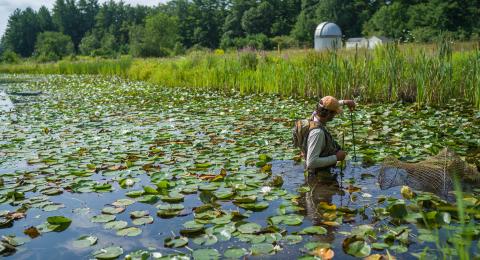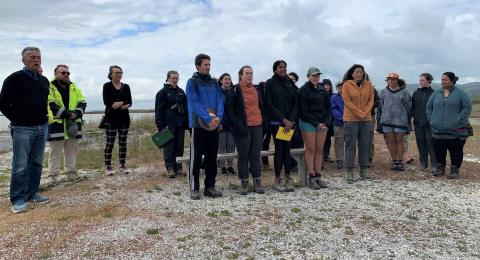An Environmental and Resource Economics minor at UNH equips you with the tools to analyze and solve pressing environmental challenges through an economic lens. This minor focuses on the sustainable use of natural resources, environmental policy and the economic impact of environmental decisions and appeals to students who are both passionate about economics and environmental issues and enjoy interdisciplinary problem-solving.
WHAT IS ENVIRONMENTAL RESOURCE ECONOMICS?
The environmental and resource economics (EREC) minor uses applied economic theory to study problems that impact land use, water, agriculture, forestry, fisheries and local communities and can include the study of environmental and natural resource economics, agricultural economics, community economics or public resource policy. This minor is well-suited to students who are interested in determining how best to conserve natural resources and protect the environment and want to understand how to evaluate competing interests and risks.
WHY STUDY ENVIRONMENTAL RESOURCE ECONOMICS AT UNH?
The environmental and resource economics minor aims to provide students majoring in other disciplines with an understanding of environmental and resource economics, and their uses in personal, social, business and government decision-making. Students learn how to apply economic analyses in evaluating environmental and resource problems, identifying their causes and examining alternative solutions. The minor also offers courses that teach techniques useful for decision making by local and regional communities, and students obtain skills in the management of agricultural and natural-resource business firms. EREC students have extremely high rates of employment (99%+) within their field upon graduation.
POTENTIAL CAREER AREAS
- Agricultural, fisheries and forestry marketing
- Community development
- Environmental conservation
- Environmental planning and consulting
- Land- and water-use policy making
- Retail insurance and financial agencies
Curriculum & Requirements
The Environmental and Resource Economics minor aims to provide students majoring in other disciplines with an understanding of environmental and resource economics, and their uses in personal, social, business and government decision-making. Students learn how to apply economic analyses in evaluating environmental and resource problems, identifying their causes and examining alternative solutions. The minor also offers courses that teach techniques useful for decision making by local and regional communities. Students also obtain skills in the management of agricultural and natural-resource business firms.
- Academic policies related to Minors.
- The minor consists of completing five courses (20 credits) from the courses listed below, with a grade of C- or better.
- No more than 8 credits used to satisfy major requirements may be used for the minor.
- Pass/Fail courses may not be used for the minor
| Code | Title | Credits |
|---|---|---|
| Requirements | ||
| Select at least five courses (minimum of 20 credits) from the following: | 20 | |
NR 411 | Environmental and Resource Economics Perspectives | |
NR 444 | The New Pirates of the Caribbean | |
NR 525 | Statistical Methods and Applications | |
NR 572 | Introduction to Natural Resource Economics | |
NR 607 | Land Economics Perspectives: Uses, Policies, and Taxes | |
CEP 627 | Community Economics | |
NR 708W | Environmental Economics | |
NR 756W | Rural and Regional Economic Development | |
NR 795 | Investigations | |
| Total Credits | 20 | |
- 1
NR 411 cannot be taken for credit if credit has been earned for ECON 402.










